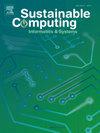基于能效和用户满意度动态的区域能源系统多目标优化
IF 5.7
3区 计算机科学
Q1 COMPUTER SCIENCE, HARDWARE & ARCHITECTURE
引用次数: 0
摘要
不断发展的能源格局正日益整合各种能源,包括电力、天然气、热能和制冷,这反映了智能技术和不断增长的可再生能源采用推动的战略转变。然而,可再生能源供应的可变性要求提高需求侧管理的灵活性。本研究提出了一种通过两层闭环模型优化区域综合能源系统的新方法,该模型结合了能源效率和用户满意度动态。该模型解决了传统能源系统的局限性,传统能源系统通常在单一能源的约束下运行,无法完全整合可再生能源。提出的模型通过使用包括经济、环境和能源效率考虑在内的多目标框架来优化能源生产、转换、传输和消费。所提出的优化方法显著提高了综合能源系统的性能。能源效率提高8.36 %,火用效率显著提高1.61 %。排放量减少了约16.3% %,证明了该模型的环境效益。尽管运营成本略有上升,但这种权衡有利于可持续性,并在能源和环境方面取得实质性成果。改进的多目标粒子群优化(Multi-Objective Particle Swarm Optimization, MOPSO)算法优于NSGA-II和Standard PSO等传统方法,实现了更高的Hypervolume值,具有更好的收敛性和解的多样性。这使得MOPSO成为解决能源管理中多目标优化问题的有力工具。本文章由计算机程序翻译,如有差异,请以英文原文为准。
Multi-objective optimization of regional energy systems with exergy efficiency and user satisfaction dynamics
The evolving energy landscape is increasingly integrating diverse energy sources, electricity, gas, heat, and cooling, reflecting a strategic shift driven by smart technologies and rising renewable adoption. However, the variability of renewable supply requires enhanced flexibility in demand-side management. This study presents a novel approach to optimizing regional integrated energy systems through a two-layer closed-loop model that incorporates exergy efficiency and user satisfaction dynamics. The model addresses the limitations of traditional energy systems, which often operate within the constraints of singular energy resources and fail to fully integrate renewable energies. The proposed model optimizes energy production, conversion, transmission, and consumption by using a multi-objective framework that includes economic, environmental, and exergy efficiency considerations. The proposed optimization approach significantly improves the performance of integrated energy systems. The energy efficiency is enhanced by 8.36 %, while exergy efficiency shows a notable increase of 1.61 %. Emissions are reduced by approximately 16.3 %, demonstrating the environmental benefits of the model. Though operational costs rise slightly, the trade-off favors sustainability with substantial gains in energy and environmental outcomes. The modified Multi-Objective Particle Swarm Optimization (MOPSO) algorithm outperforms traditional methods like NSGA-II and Standard PSO, achieving a higher Hypervolume value, indicating better convergence and solution diversity. This makes MOPSO a robust tool for solving multi-objective optimization problems in energy management.
求助全文
通过发布文献求助,成功后即可免费获取论文全文。
去求助
来源期刊

Sustainable Computing-Informatics & Systems
COMPUTER SCIENCE, HARDWARE & ARCHITECTUREC-COMPUTER SCIENCE, INFORMATION SYSTEMS
CiteScore
10.70
自引率
4.40%
发文量
142
期刊介绍:
Sustainable computing is a rapidly expanding research area spanning the fields of computer science and engineering, electrical engineering as well as other engineering disciplines. The aim of Sustainable Computing: Informatics and Systems (SUSCOM) is to publish the myriad research findings related to energy-aware and thermal-aware management of computing resource. Equally important is a spectrum of related research issues such as applications of computing that can have ecological and societal impacts. SUSCOM publishes original and timely research papers and survey articles in current areas of power, energy, temperature, and environment related research areas of current importance to readers. SUSCOM has an editorial board comprising prominent researchers from around the world and selects competitively evaluated peer-reviewed papers.
 求助内容:
求助内容: 应助结果提醒方式:
应助结果提醒方式:


